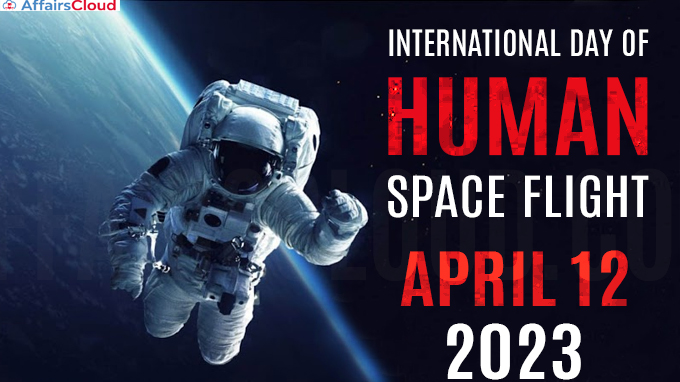 The United Nations (UN)’s International Day of Human Space Flight is annually observed across the globe on April 12 to mark the beginning of the space era for mankind, the contribution of space science and technology, and ensure the realisation of the conservation of outer space for peaceful purposes.
The United Nations (UN)’s International Day of Human Space Flight is annually observed across the globe on April 12 to mark the beginning of the space era for mankind, the contribution of space science and technology, and ensure the realisation of the conservation of outer space for peaceful purposes.
- International Day of Human Space Flight 2023 was observed on 12th April 2023.
Background:
i. The United Nations General Assembly (UNGA) adopted the resolution A/RES/65/271 on 7th April 2011 and declared April 12 of every year as International Day of Human Space Flight.
ii. The 1st ever International Day of Human Space Flight was observed on 12th April 2011.
Note: 2011 marked the 50th anniversary of the first-ever human space and the 50th anniversary of the 1st session of the Committee on the Peaceful Uses of Outer Space.
Why April 12?
12th April 1961 was the date of the first human space flight. The 1st human space flight was carried out by Russian cosmonaut Yuri Gagarin, a citizen of the Soviet Union.
- He travelled into space on the Vostok 1 mission in 1961 and completed one orbit around the Earth in 108 minutes in the Vostok 3KA spacecraft launched by the Vostok K launch vehicle.
Significant Achievements in Outer Space:
i. Sputnik I, the 1st human-made Earth satellite, was launched into outer space in 1957.
ii. Yuri Gagarin became the 1st human to orbit the Earth in 1961.
iii. Neil Armstrong was the 1st person to step foot on the Moon’s surface in 1969.
iv. The 1st launch of the multinational Space Station, a 16-nation multinational space mission, was held in 1998.
v. Valentina Tereshkova was the 1st woman to travel to space and the 1st woman to orbit the Earth in 1963.
vi. The docking of the Apollo and Soyuz spacecraft in 1975 was the 1st international human mission in space.
UN and Space:
i. The UNGA adopted the first international human mission in space in recognition of the shared human interest in space and to address the question of how space can benefit humans.
ii. The United Nations Office for Outer Space Affairs (UNOOSA) is the UN office responsible for promoting international cooperation in the peaceful uses of outer space.
iii. The UNGA adopted its first resolution related to outer space, resolution 1348 (XIII) entitled “Question of the Peaceful Use of Outer Space”.
iv. The “Magna Carta of Space,” also known as the Treaty on Principles Governing the Activities of States in the Exploration and Use of Outer Space, including the Moon and Other Celestial Bodies, entered into force in 1967.
About the United Nations Office for Outer Space Affairs (UNOOSA):
Acting Director- Niklas Hedman
Headquarters- Vienna, Austria
Establishment- 1958




